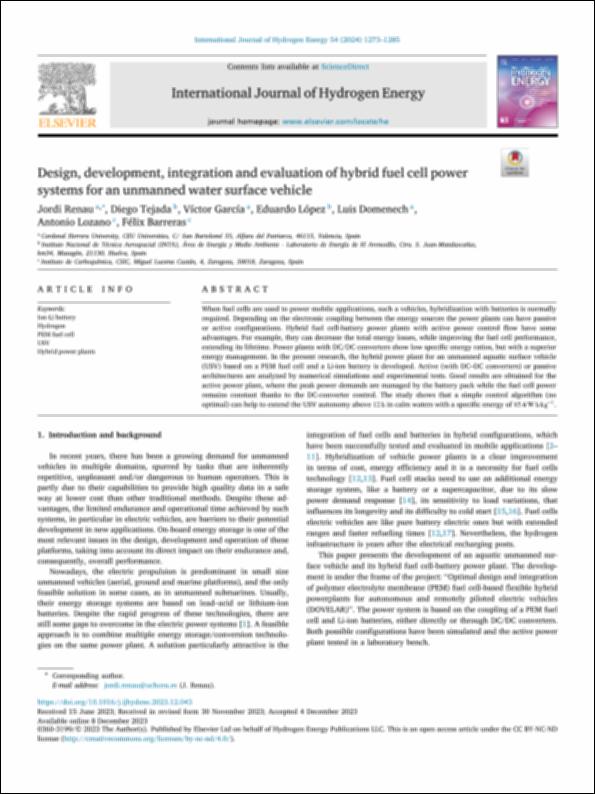Por favor, use este identificador para citar o enlazar este ítem:
http://hdl.handle.net/10637/14842Design, development, integration and evaluation of hybrid fuel cell power systems for an unmanned water surface vehicle
| Título : | Design, development, integration and evaluation of hybrid fuel cell power systems for an unmanned water surface vehicle |
| Autor : | Renau Martínez, Jordi Tejada, Diego García Peñas, Víctor López, Eduardo Doménech Ballester, Luis Lozano Fantoba, Antonio Barreras Toledo, Félix Manuel |
| Materias: | Hidrógeno; Hydrogen; Energy resources; Recursos energéticos; Fuente de energía renovable; Renewable energy sources |
| Editorial : | Elsevier |
| Citación : | Renau, J., Tejada, D., García, V., López, E., Domenech, L., Lozano, A. & Barreras, F. (2024). Design, development, integration and evaluation of hybrid fuel cell power systems for an unmanned water surface vehicle. International Journal of Hydrogen Energy, vol. 54 (feb.), pp. 1273-1285. DOI: https://doi.org/10.1016/j.ijhydene.2023.12.043 |
| Resumen : | When fuel cells are used to power mobile applications, such a vehicles, hybridization with batteries is normally required. Depending on the electronic coupling between the energy sources the power plants can have passive or active configurations. Hybrid fuel cell-battery power plants with active power control flow have some advantages. For example, they can decrease the total energy losses, while improving the fuel cell performance, extending its lifetime. Power plants with DC/DC converters show low specific energy ratios, but with a superior energy management. In the present research, the hybrid power plant for an unmanned aquatic surface vehicle (USV) based on a PEM fuel cell and a Li-ion battery is developed. Active (with DC–DC converters) or passive architectures are analyzed by numerical simulations and experimental tests. Good results are obtained for the active power plant, where the peak power demands are managed by the battery pack while the fuel cell power remains constant thanks to the DC-converter control. The study shows that a simple control algorithm (no optimal) can help to extend the USV autonomy above 12 h in calm waters with a specific energy of 85.6 W h kg-1. |
| URI : | http://hdl.handle.net/10637/14842 |
| Derechos: | Open Access http://creativecommons.org/licenses/by-nc-nd/4.0/deed.es |
| ISSN : | 0360-3199 |
| Cubierto por: | Acuerdo Transformativo – 2023 |
| Fecha de publicación : | 7-feb-2024 |
| Centro : | Universidad Cardenal Herrera-CEU |
| Aparece en las colecciones: | Dpto. Matemáticas, Física y Ciencias Tecnológicas |
Los ítems de DSpace están protegidos por copyright, con todos los derechos reservados, a menos que se indique lo contrario.


